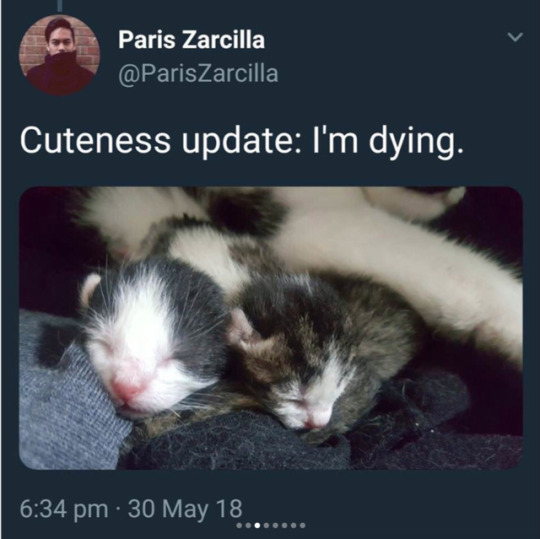Exploring A New Way of Life. Novice witch,interests include divination, spiritwork, crystals and gems. Drawn to water and the moon. Empath.
Don't wanna be here? Send us removal request.
Photo

Supportive dad cat being there for his wife and kids.
185K notes
·
View notes
Text
If I Encounter One More Trade Name For A Gemstone Or Other Attractive Mineral I Will Puke
I’ve been making jewelry for a number of years now. Pretty early on I was directed to a company called Fire Mountain Gems as a potential supplier. They sent a copy of their catalog with my first order, which introduced me to a *lot* of stones I’d never heard of… more than a few of which had trade names.
Now, understand, humanity has only relatively recently become fussy about how accurately they name their stones. For a big stretch of history, if it was reasonably hard and red OR dark red OR black with red highlights when you tilted it right, they’d probably call it a ruby. (Example: the Black Prince’s Ruby in the state crown of England, which is a completely different gemstone called a spinel, but they named it before the 1780s which is when we started being able to actually identify rubies as rubies. So… yeah.) Some kinds of gem have had lots and lots of different names all historically referring to the same stone. It makes for interesting reading of historic accounts of this or that piece of jewelry. I can excuse it, it was the past, really formal gemology is only a moderately recent thing.
But these days I go to the store and I see yellow gemmy-looking beads hanging on the rack, and I look at the sticker, and it says ‘yellow jade’, only the price is way less than that much actual jade would cost online. Or I go to look for smaller beads to match a few pieces of actual turquoise that I have on hand, and I realize that I have no idea whether African turquoise is actually turquoise or not. It gets… irritating. I want to actually know what the hell I’m paying for and whether it’s hard enough to risk putting it in a bracelet or ring, or whether it’s a softer stone that should be kept in earrings and necklaces, away from possible scratching or impact. If you’re buying jewelry, or if you’re looking for stones for jewelry work, or if you’re someone who believes in the metaphysical properties of stones and crystals, you’re going to want an accurate understanding of whatever it is you’ve got in front of you, right? Right.
So, yeah. Here’s a few of the trade names I’ve been stumbling over since I got started in jewelry making.
New jade - This is serpentine. It’s a pretty rock but it’s not jadeite or nephrite; it’s not actually jade. Serpentine’s way common, since it’s basically a form of one of the most common minerals in the earth’s crust.
Mountain jade - A kind of dolomite marble. Also not jade.
Ching Hai jade - Dolomite plus a couple of other minerals. Pretty, but not jade. Let me put it like this: on the Mohs scale of mineral hardness, nephrite jade is 6 to 6.5 and jadeite is 6.5 to 7. Ching Hai jade is 3.5 to 4. This stuff is softer than the outer coating of human teeth (Mohs 5, same as a basic knife blade and most kinds of everyday glass). You want a stone you can put in a ring where it’ll get whacked or bounced off hard surfaces or otherwise stand a chance of impact, you’re gonna want real jade. Ching Hai jade will get scratched clear to kingdom come with a Mohs score like that.
Yellow jade - It’s quartz. Nephrite jade comes in a lot of colors including yellow, but if they’ve labeled it ‘yellow jade’ rather than saying ‘jade’ or ‘nephrite jade’ then it’s quartz. Same deal for 'golden jade’.
Malaysia jade - Also quartz.
African jade - yep, still quartz.
Black jade - Both nephrite and jadeite come in black forms, but if a stone is being sold with the name 'black jade’, it’s 90% likely to be serpentine. Actual jade gets labeled as jadeite or nephrite. I don’t do metaphysical stone foo, but man, if you’re buying a stone because you want to use its mojo, seems to me you’d want to get the actual stone associated with what you’re trying to do, not a stone that’s the same color and level of shiny.
Peace jade - Serpentine plus white quartz. I don’t even know where they came up with this name. It’s pretty but it’s jade the way a pommel horse is a horse.
Yellow turquoise - Serpentine again. Or rather, serpentine and quartz. At least this stuff comes from the same mines as turquoise.
African turquoise - Jasper. It’s turquoise colored, but it’s actually harder than real turquoise, for whatever that’s worth.
Italian onyx - They also call this one onyx marble. It’s a kind of calcite. Takes dye really well so they use it in different color forms.
African bloodstone / Indian bloodstone - Legit name for the actual stone, for once! These are both names for the same thing. They also call it heliotrope. So any of those names all refer to the same thing.
Tigerskin jasper - And we’re back to the malarkey; this is limestone. With pretty stripes, but seriously, it’s not even jasper and jasper gets used as a substitute for other stones so wtf.
Bumblebee jasper - Sometimes they call this bumblebee agate. It’s not jasper. It’s not agate. Bumblebee jasper is volcano lava and sediment that’s resulted in swirly yellow and black layers. I mean, it’s pretty, sell it as much as you want, but IT ISN’T EVEN CLOSE TO BEING JASPER.
Aqua terra jasper - Onyx marble. They also call it impression stone, but it’s marble, and it’s on the soft side as stones go. Marble’s around Mohs 3 on a good day. That’s another stone you can scratch with your teeth.
Green Earth jasper - NOPE. Serpentine. Sorry.
Peridot jasper - Serpentine. Seriously, do you have any idea how many stones with pretty pretty names are actually just pretty pretty names for different colors of serpentine?
Zebra jasper - onyx marble.
Chinese chrysoprase- Oh look it’s serpentine again
Lemon chrysoprase - This is magnesite. Not dyed, which is a little unusual. Magnesite takes dye really well and gets sold in a lot of colors as a substitute for other stones. Selling it as lemon chrysoprase means someone managed to get hold of a yellowish color of the stuff.
Mosaic turquoise - If it’s labeled mosaic anything, it’s almost always fragments of a stone bound together with resin, and probably not even the stone it claims to be. Mosaic turquoise is ittybitty chips of magnesite that’s been dyed to match turquoise color, then stabilized together as a single piece. It’s not even close to being turquoise.
Green opal - okay, quick lesson: there are different kinds of opal, and not all of them have the flashy color changing fire you get with precious stones like Welo opal or Australian opal. Mexican fire opal and Oregon fire opal are good examples of other forms. The actual stone we call opal is a specific kind of silica with a certain level of water content, not just the pretty flashiness. And opals of both the flashy kind and the non-flashy kind do come in green. But if they’re selling it as 'green opal’, they are selling you chalcedony. Chemically similar, but not as pretty, and a distinctly harder stone.
Red malachite - This is marble. They find marble with banding that resembles malachite banding and they cut it and polish it to look like malachite, just in a different color. Malachite is green; this isn’t even a thing like jade coming in different colors. There isn’t actual red malachite.
Opaline - this isn’t even a stone. This is glass. Same deal with 'sea opal’. Sorry. Sometimes they sell chalcedony as opaline but whatever it is you’ve found it’s not opal.
Fused quartz - Glass. This is glass. Fancypants glass, but it’s glass.
Goldstone, or blue goldstone: Also glass. With bits of copper in it to produce really nice sparkly effects, but it’s still a kind of glass.
Sand stone or blue sand stone: I only found out recently that some people sell goldstone as 'sandstone’, so… this one’s glass too. Actual sandstone is a sorta brown sedimentary rock.
Black moss quartz - This is glass. Worth noting, there’s a vaguely similar product out there called rutilated quartz. That’s actual quartz with spindly intrusions of a different mineral, rutile. Difference is, the quartz has a Mohs hardness of 7 and will scratch the 'black moss quartz's’ soft bitch ass six ways from Sunday as a result.
Fordite - This is paint. Fordite is automotive enamel that’s dripped onto the same spot on factory floors for so many years that it’s built up to the point where it can be cut and polished and made into jewelry elements. Unlike a lot of trade names, this one isn’t a form of bullshit to pass one thing off as another. People who go looking for fordite are specifically looking for gemstone quality layered automobile paint. Sometimes they call it Detroit agate or motor agate, but that’s more of a joke than an attempt to sell the stuff to people looking for actual agate. I can live with this trade name.
Rainbow calsilica: Apparently there’s just a huge amount of argument about this and some people say 'this is natural and we found it and it’s got pretty pretty stripes of all different colors just naturally and it’s a totally awesome metaphysical marvel of a totally natural gemstone’, but the Journal of the Gemological Institute of America says ’dude, you powdered carbonated rock and added paint and stabilized it with resin, wtf’. So yeah, be warned. I mean, it’s pretty and all, and you’ll probably pay way less for it than for chrysocolla (a natural stone with somewhat similar striping), but… be aware it’s probably something a guy in a factory or a lab put together, okay?
And citrine: Okay, this isn’t exactly a case of trade name bullshittery, but, uh. Natural citrine is stupid rare. Most citrine these days used to be amethyst. Take a crappy piece of amethyst with faint color or gray tones and heat the hell out of it long enough, and it turns yellow, and you can legally sell it as citrine. If you’ve got citrine crystals and the yellow color is most intense up in the tips, you’ve almost certainly got former amethyst there. Fair warning.
So… yeah. Lot of trade names out there. Some of them total bupkis. Some only partly so. Heads up, and if you’re in the market for a gem or a crystal or something like that, do yourself a favor and look up the name somewhere reliable first just so you know what you’re buying.
13K notes
·
View notes
Text
I may not be a perfect person but at least I have never yelled at an employee in a store
1M notes
·
View notes
Text
“I visited the pumpkin patch yesterday and decided to bring home a pumpkin that in shape appeared to be a penguin. Friends and family were mystified until I started painting him.“
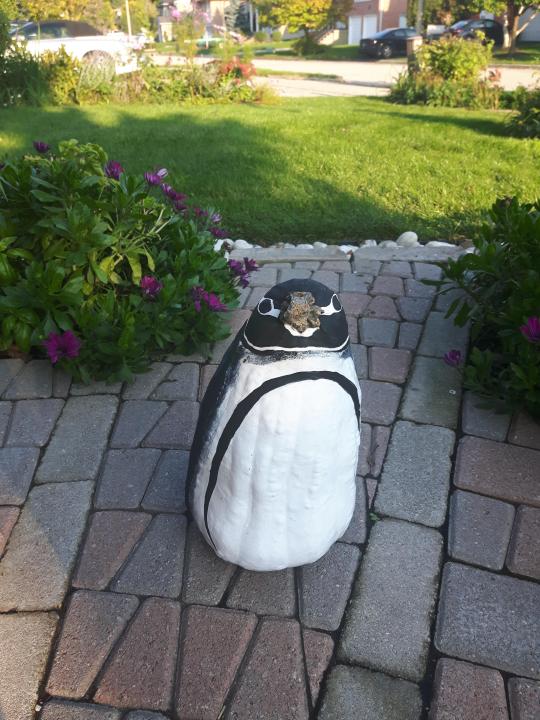
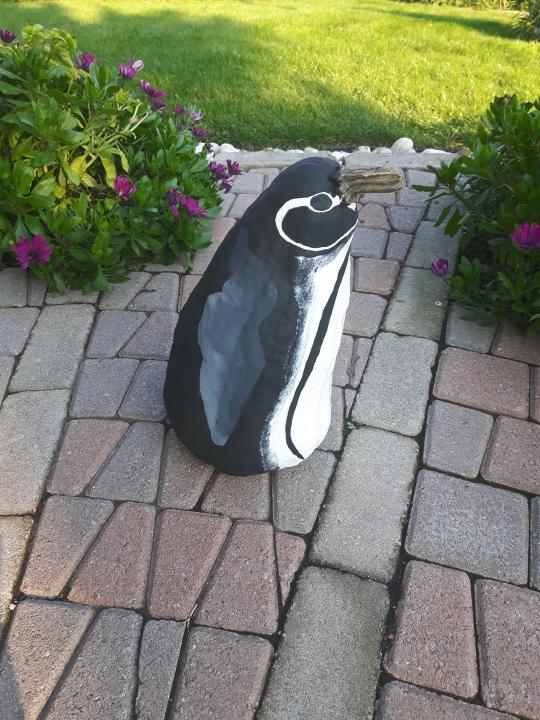
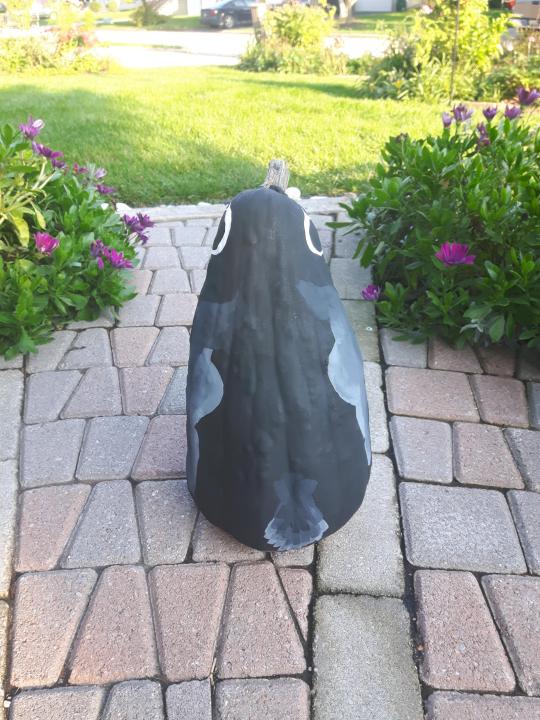
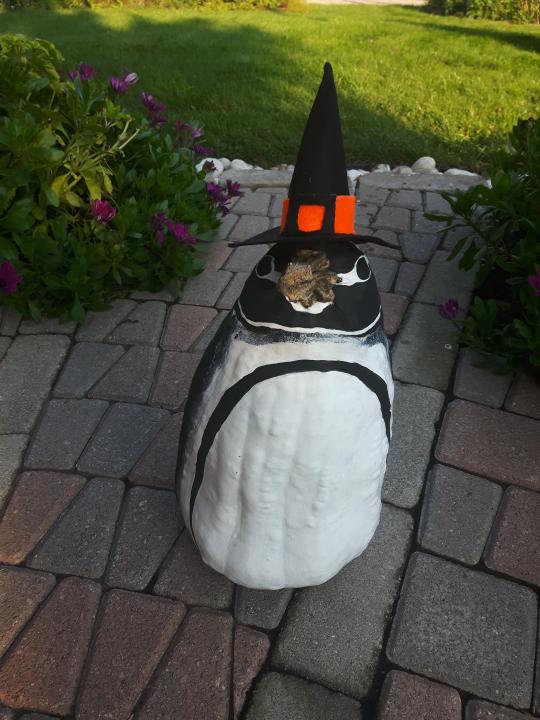
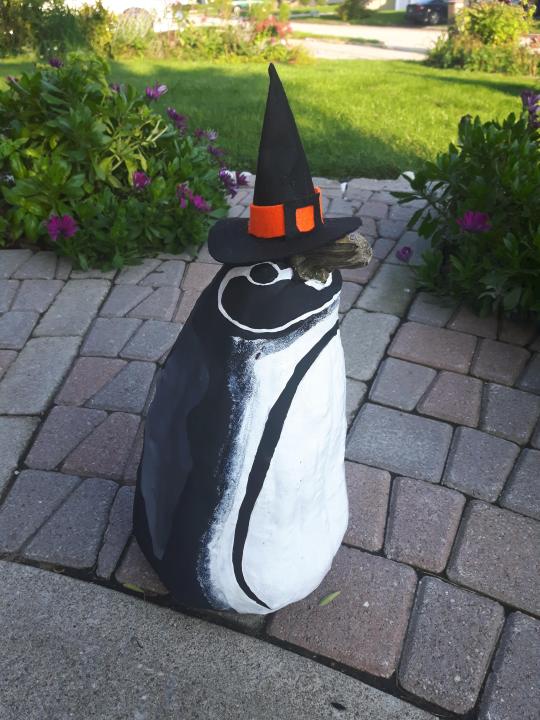
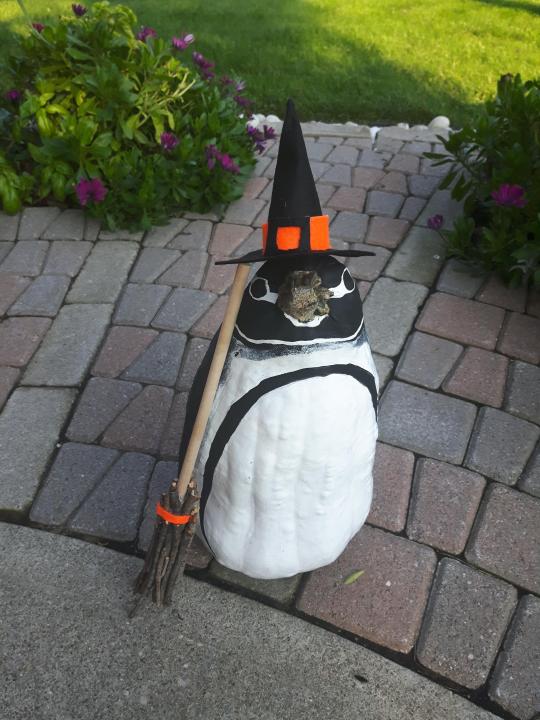
by Volensblood
331K notes
·
View notes
Photo



Pretty Stones
aragonite • chalcopyrite • botswana agate
421 notes
·
View notes
Text


Plenty of spooky treats are now available!!
Only on floralsgifts.com 👻
1K notes
·
View notes
Text
Significance of Ravens

Cultures around the world either depict ravens in a benevolent, or malevolent way. That aside, they are probably one of the world’s most intelligent birds, and indeed, very playful; they are one of only a few wild animals who make their own toys. They have been observed breaking off twigs to play with socially.
Ravens In Norse Culture

The highest Norse god, Odin, has two ravens named Huginn and Muninn (“Memory” and “Thought”).
Ravens were linked to death and war, due to their preference for carrion.
Ravens appear in almost ever skaldic poem describing warfare.
Flóki Vilgerðarson was the first Norseman to intentionally sail to Iceland. On his ship he had three ravens, and whenever he thought land was near, he would release them - if the ravens would fly back, land was not near. The ravens always came back to the ship but one day, the third raven flew forwards. Floki followed that raven and found Iceland.
Ravens In Celtic Lore

They were linked to darkness and death – especially the death of warriors in battle.
Many Celtic goddesses with linked to the raven, because goddesses were usually aggressive deities.
This lead to the raven being the harbinger of doom and destruction.
Ravens were associated with the otherworld.
The other main characteristic of Raven in Irish and Welsh myth is that of prophesy.
Among the Irish Celts, the raven was associated with the Triple Goddess, the Morrigan, who took the shape of a raven over battlefields while protecting warriors.
Irish and Scots Bean Sidhes (Banshees) can take the form of ravens. Their calls from over the roof of a dwelling was considered to be an omen of death for the occupants.
“To have a raven’s knowledge” is an Irish proverb meaning to have a seer’s supernatural powers
Ravens In Native American Culture

Native Americans called the raven the messenger of death. The Raven is found in the stories of most tribes and is generally considered a Trickster.
The raven is a creature of metamorphosis.
Foremost, the Raven is the Native American bearer of magic, and a harbinger of messages from the cosmos. Messages that are beyond space and time are nestled in the midnight wings of the Raven and come to only those within the tribe who are worthy of the knowledge.
The Raven is also a keeper of secrets.
Ravens In Greco-Roman Times

But the Raven has not always been associated with death, spirits and darkness. Quite the contrary, the Raven was believed to be the bringer of light, truth and goodness.
They are said to be a symbol of good luck.
They were the god’s messengers in the mortal world.
Ravens often acted as the protectors of human seers.
Ravens were sacred to Apollo, the god of prophecy, and were oracular birds to him.
701 notes
·
View notes
Photo

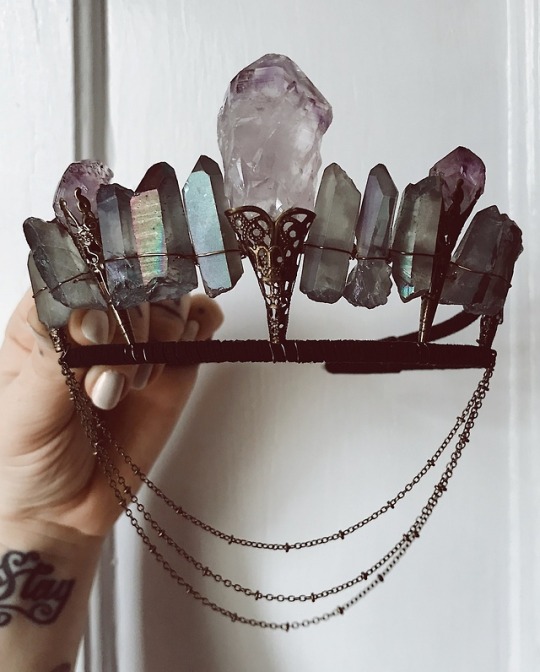
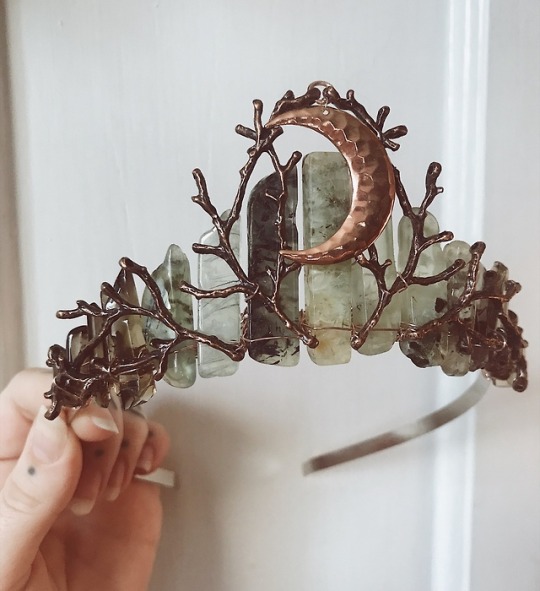
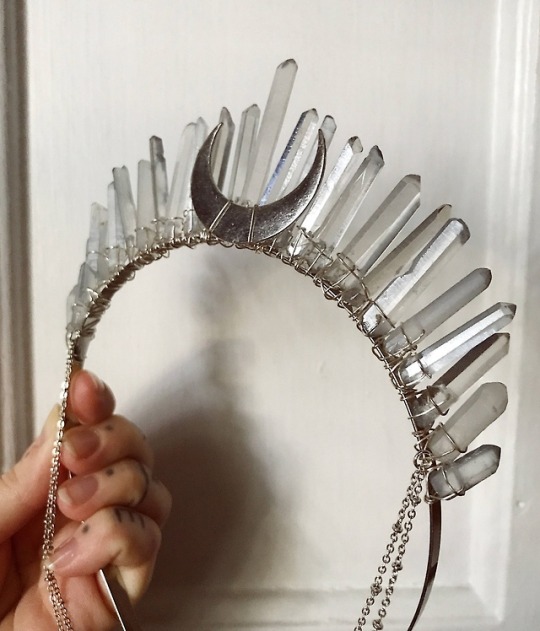
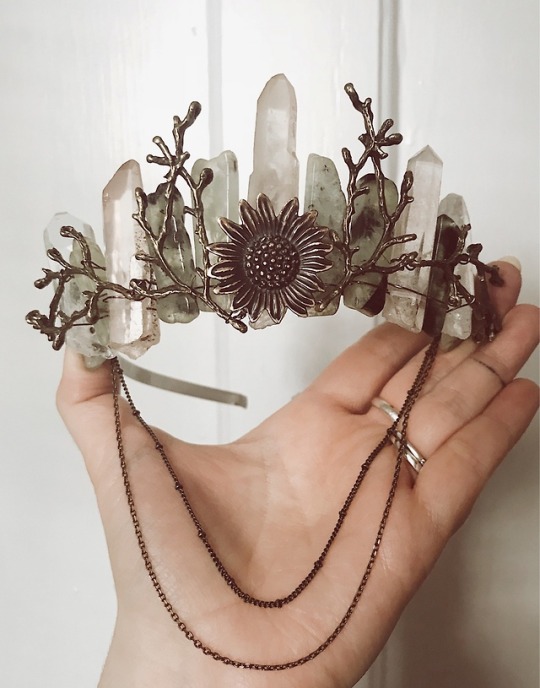
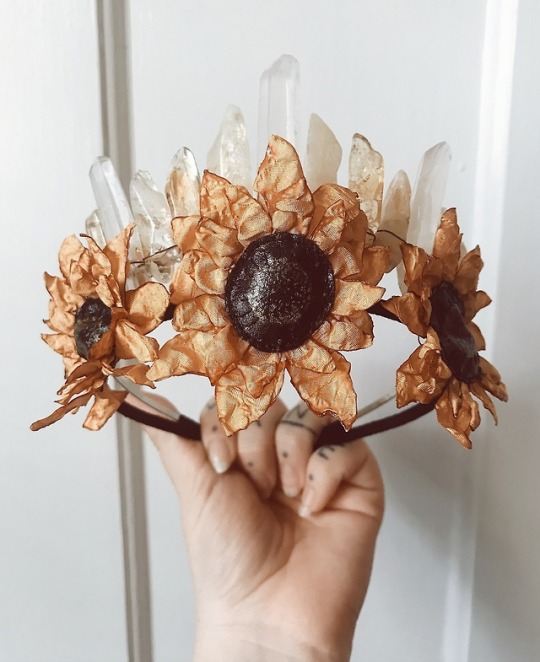

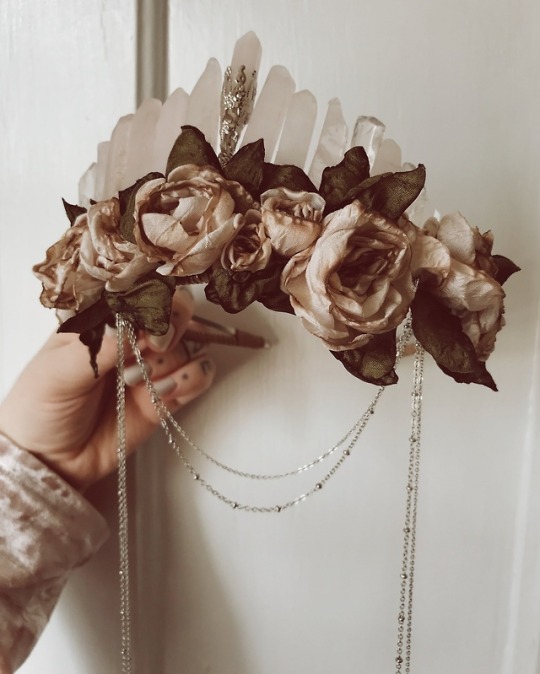

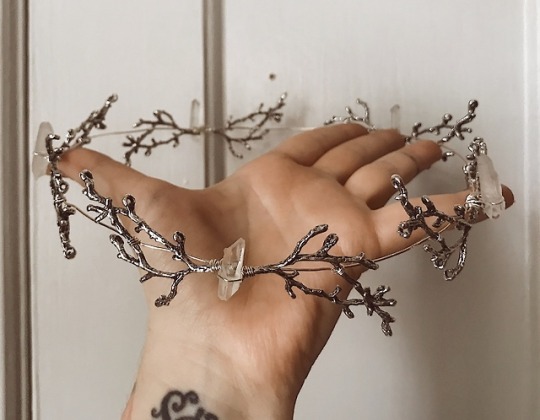
Crystal Crowns
Owisteria on Etsy
See our #Etsy or #Crowns tags
67K notes
·
View notes
Text


My first ever spell book is officially available for sale on floralsgifts.com!! It was written for all stages of practice and meant to be accessible for all witches — whether spoonies, on a budget, with limited time or resources ♥️
2K notes
·
View notes
Text
“Solitude matters, and for some people, it’s the air they breathe.”
— Susan Cain (via fyp-psychology)
7K notes
·
View notes













